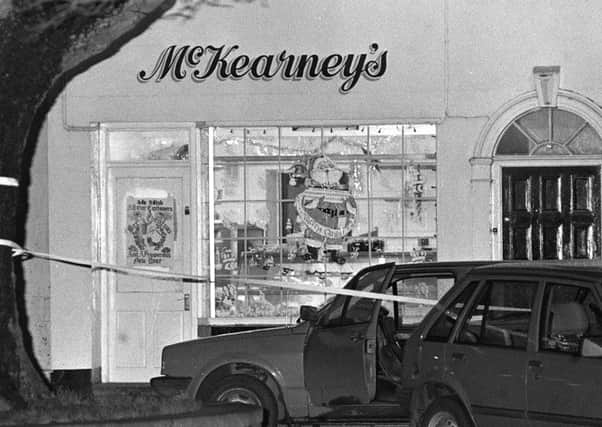Bid to sue DPP over 1992 UVF murders thrown out


A judge held that the potentially landmark claim brought over the killings of Kevin and Jack McKearney at their Co Tyrone butcher’s shop was both defective and frivolous.
Lawyers representing Kevin McKearney’s widow, Bernadette, are now set to appeal the decision to strike out a writ against the prosecuting authority.
Advertisement
Advertisement
A UVF gunman shot the two men at the family shop in Moy in January 1992.
Kevin McKearney, 32, was killed instantly, while his uncle Jack, 70, died later in hospital.
The murders were investigated by the police’s Historical Enquiries Team (HET) amid relatives’ claims that a death threat received by the family days before the shooting was not properly investigated by the RUC.
In 2012 the HET concluded that police had not done enough to prevent the killings, but found no evidence of collusion with the terrorists.
Advertisement
Advertisement
Mrs McKearney is already suing the chief constable and the Ministry of Defence (MoD), alleging negligence, misfeasance in public office and a human rights breach over events surrounding the shooting.
Her legal team wanted to join the director of public prosecutions to the lawsuit, claiming staff within the department had failed to pursue all possible leads to establish circumstances and wrongdoing.
Criticism centred on the non-prosecution of three people, including UVF man Laurence George Maguire.
In 1994 Maguire reportedly received five life sentences, together with a total of 480 years in jail, when he admitted 41 terror-related offences including murder, attempted murder, armed robbery and blackmail.
Advertisement
Advertisement
He was the first person to be charged with directing terrorism.
The court heard he was also considered for the offences of murdering Kevin and Jack McKearney, but it was ultimately decided there was insufficient evidence to prosecute.
Counsel for Mrs McKearney argued that he should have faced a criminal charge in relation to their deaths, based on a pattern of him buying cars subsequently used in killings.
But a barrister representing the director sought to have the case against him struck out.
Advertisement
Advertisement
He argued that it was not legally possible to make the prosecution decision Mrs McKearney wanted.
The director has neither an investigatory role nor any responsibility for pursuing all possible leads, the court heard.
Setting out reasons for agreeing to strike out the action against the prosecuting authority, Master Bell held it had no function to pursue all possible leads in the murder.
“I conclude for the reasons set out above that the statement of claim in this case is defective,” he said.
Advertisement
Advertisement
“Even if I had not reached this conclusion ... I would have struck out the litigation against the director on the basis that it was frivolous or vexatious, that is to say obviously unsustainable.
“I consider that, on the basis of the evidence submitted to the director, in respect of Mr McKearney’s murder, the director’s decisions were entirely appropriate.”
Master Bell added: “Nothing of course in this decision affects the plaintiff’s litigation against the chief constable, the Ministry of Defence and the secretary of state for defence which now continues.”